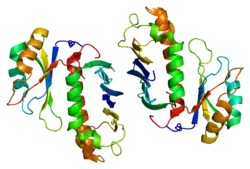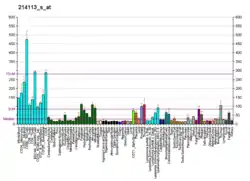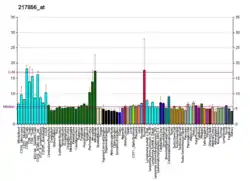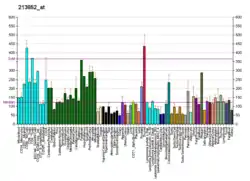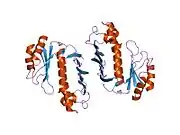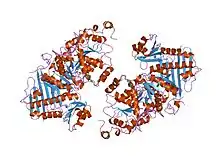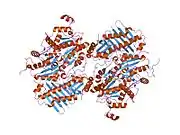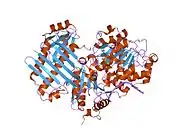RBM8A
RNA-binding protein 8A is a protein that in humans is encoded by the RBM8A gene.[5][6]
This gene encodes a protein with a conserved RNA-binding motif. The protein is found predominantly in the nucleus, although it is also present in the cytoplasm. It is preferentially associated with mRNAs produced by splicing, including both nuclear mRNAs and newly exported cytoplasmic mRNAs. It is thought that the protein remains associated with spliced mRNAs as a tag to indicate where introns had been present, thus coupling pre- and post-mRNA splicing events. Previously, it was thought that two genes encode this protein, RBM8A and RBM8B; it is now thought that the RBM8B locus is a pseudogene. Two alternative start codons result in two forms of the protein, and this gene also uses multiple polyadenylation sites.[7]
Related gene problems
References
- GRCh38: Ensembl release 89: ENSG00000265241 - Ensembl, May 2017
- GRCm38: Ensembl release 89: ENSMUSG00000038374 - Ensembl, May 2017
- "Human PubMed Reference:". National Center for Biotechnology Information, U.S. National Library of Medicine.
- "Mouse PubMed Reference:". National Center for Biotechnology Information, U.S. National Library of Medicine.
- Conklin DC, Rixon MW, Kuestner RE, Maurer MF, Whitmore TE, Millar RP (October 2000). "Cloning and gene expression of a novel human ribonucleoprotein". Biochim Biophys Acta. 1492 (2–3): 465–9. doi:10.1016/s0167-4781(00)00090-7. PMID 11004516.
- Salicioni AM, Xi M, Vanderveer LA, Balsara B, Testa JR, Dunbrack RL Jr, Godwin AK (October 2000). "Identification and structural analysis of human RBM8A and RBM8B: two highly conserved RNA-binding motif proteins that interact with OVCA1, a candidate tumor suppressor". Genomics. 69 (1): 54–62. doi:10.1006/geno.2000.6315. PMID 11013075.
- "Entrez Gene: RBM8A RNA binding motif protein 8A".
- Mingot, J M; Kostka S; Kraft R; Hartmann E; Görlich D (July 2001). "Importin 13: a novel mediator of nuclear import and export". EMBO J. England. 20 (14): 3685–94. doi:10.1093/emboj/20.14.3685. ISSN 0261-4189. PMC 125545. PMID 11447110.
- Zhao, X F; Nowak N J; Shows T B; Aplan P D (January 2000). "MAGOH interacts with a novel RNA-binding protein". Genomics. UNITED STATES. 63 (1): 145–8. doi:10.1006/geno.1999.6064. ISSN 0888-7543. PMID 10662555.
- Kataoka, N; Diem M D; Kim V N; Yong J; Dreyfuss G (November 2001). "Magoh, a human homolog of Drosophila mago nashi protein, is a component of the splicing-dependent exon–exon junction complex". EMBO J. England. 20 (22): 6424–33. doi:10.1093/emboj/20.22.6424. ISSN 0261-4189. PMC 125744. PMID 11707413.
- Kim, V N; Kataoka N; Dreyfuss G (September 2001). "Role of the nonsense-mediated decay factor hUpf3 in the splicing-dependent exon-exon junction complex". Science. United States. 293 (5536): 1832–6. Bibcode:2001Sci...293.1832K. doi:10.1126/science.1062829. ISSN 0036-8075. PMID 11546873. S2CID 12018200.
- Klopocki E, Schulze H, Strauss G, et al. (February 2007). "Complex Inheritance Pattern Resembling Autosomal Recessive Inheritance Involving a Microdeletion in Thrombocytopenia–Absent Radius Syndrome". Am. J. Hum. Genet. 80 (2): 232–40. doi:10.1086/510919. PMC 1785342. PMID 17236129.
Further reading
- Wilson KF, Fortes P, Singh US, et al. (1999). "The nuclear cap-binding complex is a novel target of growth factor receptor-coupled signal transduction". J. Biol. Chem. 274 (7): 4166–73. doi:10.1074/jbc.274.7.4166. PMID 9933612.
- Zhao XF, Nowak NJ, Shows TB, Aplan PD (2000). "MAGOH interacts with a novel RNA-binding protein". Genomics. 63 (1): 145–8. doi:10.1006/geno.1999.6064. PMID 10662555.
- Kataoka N, Yong J, Kim VN, et al. (2000). "Pre-mRNA splicing imprints mRNA in the nucleus with a novel RNA-binding protein that persists in the cytoplasm". Mol. Cell. 6 (3): 673–82. doi:10.1016/S1097-2765(00)00065-4. PMID 11030346.
- Zhang QH, Ye M, Wu XY, et al. (2001). "Cloning and Functional Analysis of cDNAs with Open Reading Frames for 300 Previously Undefined Genes Expressed in CD34+ Hematopoietic Stem/Progenitor Cells". Genome Res. 10 (10): 1546–60. doi:10.1101/gr.140200. PMC 310934. PMID 11042152.
- Le Hir H, Izaurralde E, Maquat LE, Moore MJ (2001). "The spliceosome deposits multiple proteins 20–24 nucleotides upstream of mRNA exon–exon junctions". EMBO J. 19 (24): 6860–9. doi:10.1093/emboj/19.24.6860. PMC 305905. PMID 11118221.
- Mingot JM, Kostka S, Kraft R, et al. (2001). "Importin 13: a novel mediator of nuclear import and export". EMBO J. 20 (14): 3685–94. doi:10.1093/emboj/20.14.3685. PMC 125545. PMID 11447110.
- Kim VN, Kataoka N, Dreyfuss G (2001). "Role of the nonsense-mediated decay factor hUpf3 in the splicing-dependent exon-exon junction complex". Science. 293 (5536): 1832–6. Bibcode:2001Sci...293.1832K. doi:10.1126/science.1062829. PMID 11546873. S2CID 12018200.
- Lykke-Andersen J, Shu MD, Steitz JA (2001). "Communication of the position of exon-exon junctions to the mRNA surveillance machinery by the protein RNPS1". Science. 293 (5536): 1836–9. Bibcode:2001Sci...293.1836L. doi:10.1126/science.1062786. PMID 11546874. S2CID 389385.
- Hachet O, Ephrussi A (2002). "Drosophila Y14 shuttles to the posterior of the oocyte and is required for oskar mRNA transport". Curr. Biol. 11 (21): 1666–74. doi:10.1016/S0960-9822(01)00508-5. PMID 11696323. S2CID 2373806.
- Faurholm B, Millar RP, Katz AA (2002). "The genes encoding the type II gonadotropin-releasing hormone receptor and the ribonucleoprotein RBM8A in humans overlap in two genomic loci". Genomics. 78 (1–2): 15–8. doi:10.1006/geno.2001.6650. PMID 11707068.
- Kataoka N, Diem MD, Kim VN, et al. (2002). "Magoh, a human homolog of Drosophila mago nashi protein, is a component of the splicing-dependent exon–exon junction complex". EMBO J. 20 (22): 6424–33. doi:10.1093/emboj/20.22.6424. PMC 125744. PMID 11707413.
- Jurica MS, Licklider LJ, Gygi SR, et al. (2002). "Purification and characterization of native spliceosomes suitable for three-dimensional structural analysis". RNA. 8 (4): 426–39. doi:10.1017/S1355838202021088. PMC 1370266. PMID 11991638.
- Okubo K, Mitani H, Naruse K, et al. (2002). "Conserved physical linkage of GnRH-R and RBM8 in the medaka and human genomes". Biochem. Biophys. Res. Commun. 293 (1): 327–31. doi:10.1016/S0006-291X(02)00161-4. PMID 12054603.
- Lejeune F, Ishigaki Y, Li X, Maquat LE (2002). "The exon junction complex is detected on CBP80-bound but not eIF4E-bound mRNA in mammalian cells: dynamics of mRNP remodeling". EMBO J. 21 (13): 3536–45. doi:10.1093/emboj/cdf345. PMC 126094. PMID 12093754.
- Strausberg RL, Feingold EA, Grouse LH, et al. (2003). "Generation and initial analysis of more than 15,000 full-length human and mouse cDNA sequences". Proc. Natl. Acad. Sci. U.S.A. 99 (26): 16899–903. Bibcode:2002PNAS...9916899M. doi:10.1073/pnas.242603899. PMC 139241. PMID 12477932.
- Gehring NH, Neu-Yilik G, Schell T, et al. (2003). "Y14 and hUpf3b form an NMD-activating complex". Mol. Cell. 11 (4): 939–49. doi:10.1016/S1097-2765(03)00142-4. PMID 12718880.
- Fribourg S, Gatfield D, Izaurralde E, Conti E (2003). "A novel mode of RBD-protein recognition in the Y14-Mago complex". Nat. Struct. Biol. 10 (6): 433–9. doi:10.1038/nsb926. PMID 12730685. S2CID 40116577.
- Lau CK, Diem MD, Dreyfuss G, Van Duyne GD (2004). "Structure of the Y14-Magoh core of the exon junction complex". Curr. Biol. 13 (11): 933–41. doi:10.1016/S0960-9822(03)00328-2. PMID 12781131. S2CID 14752714.
